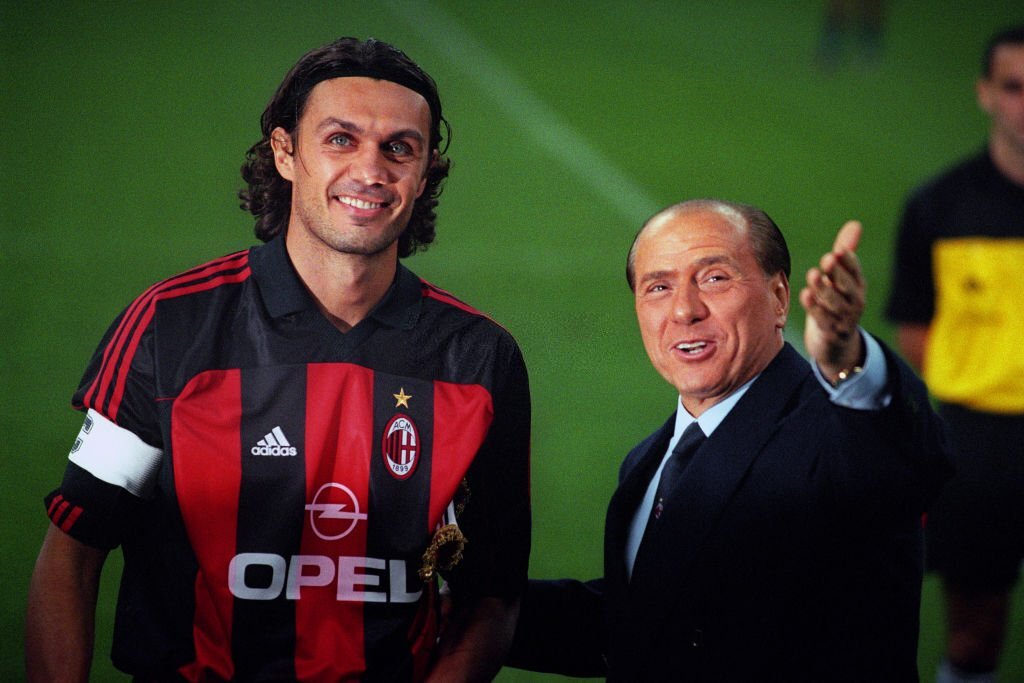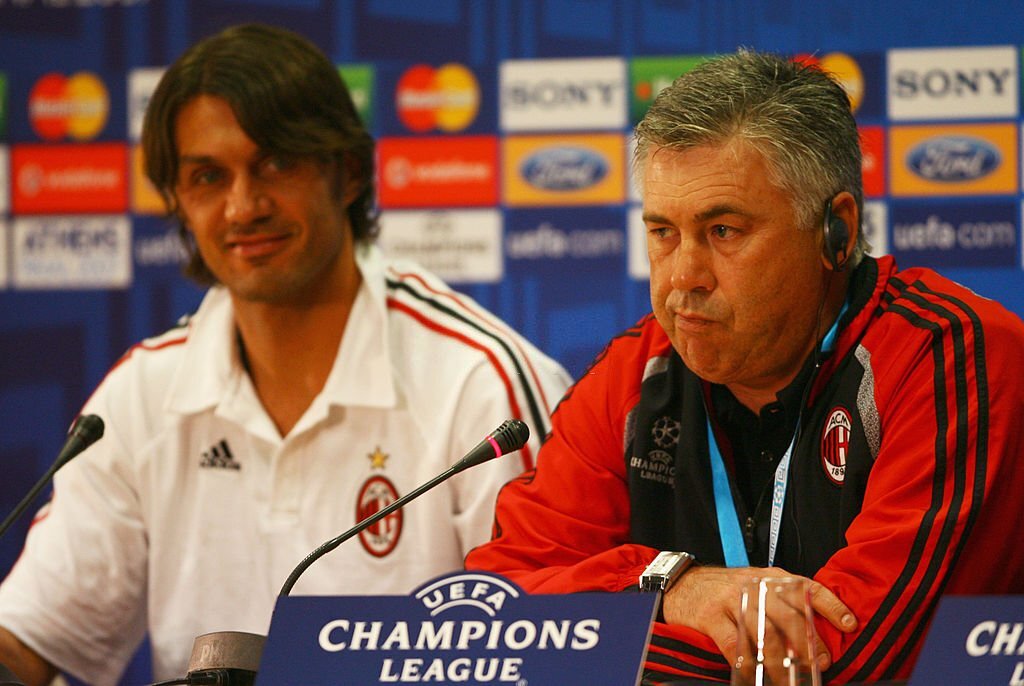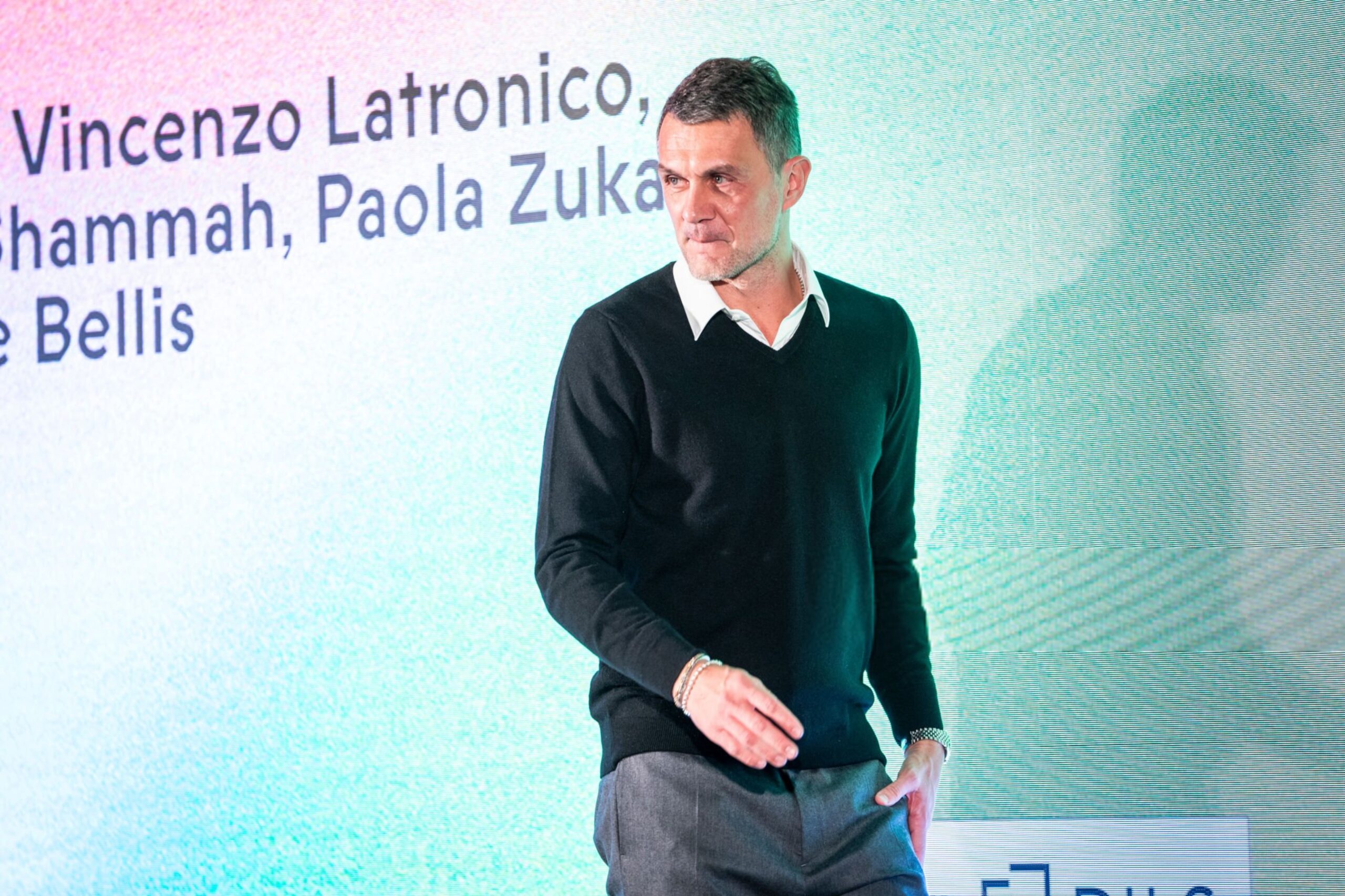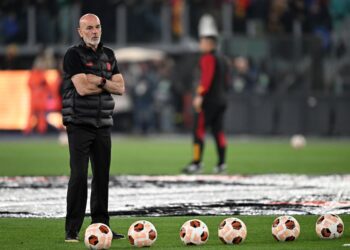Legendary number 3 of AC Milan, and ex director, Paolo Maldini, has released a brilliant and interesting interview to Radio Serie A. Here are his words:
"Milan? It was present before I was born, my dad was a player and captain. For me, Milan is the team of my city, the environment where I grew up, and it's something that goes beyond both fandom and what can be considered work. It's extreme passion. The relationship we have goes beyond eras, and it will be the same for my children. Every team can make every fan claim something special. We Milan fans have a glorious past. Milan's rebounds over the years have been sensational."
The trophy case at home... Maldini said:
"I recently set up a place in my home studio to display medals."
Gratitude towards AC Milan:
"I was born as Paolo, I try to follow the trajectory of my life. I've been fortunate to meet the right people in my career. I will always be grateful to my surroundings, to Milan, and to the people I met there. Even in my last experience at Milan, I haven't finished learning. When you see football from the other side, you see everything differently. I would erase the things I said as a player; the view is limited. Custodian of Milanism? I don't know. Football, and Milan in particular, have taught me principles. It's something beyond the result; it's more important. When talking about a centuries-old story, it needs to be studied and learned."
His son Daniel Maldini:
"His choice, like Christian's, to start playing at Milan was free. There's the overbearing dad, and in the early years, there's just a desire to play football. He, having seen me, knew what he would have to face. If I could erase this to give them happier years, I would. Sport is democratic: in the end, those with values prevail. When Daniel started playing in Milan's youth teams, a coach for a year only did dribbling and one-on-one. I said to myself: smart, interesting."
Responsibility of being a symbol for Milan's history?
"I don't feel this. Of course, when you're within a society, the role imposes it on you. When I'm out and about, I feel like Paolo, not the Milan supporter. I believe that people appreciate you over the years as a person, not just as a player. It's a matter of discipline: football should teach you that, understanding who you want to be."
When did Milanism take hold of you? Maldini answered:
"I liked football, I knew about my dad's past, being a fan in general, I loved the national team and I had seen the '78 World Cup, which was essentially Juventus. I got passionate about that story. I followed Juventus as if it were the national team, but in '78, I tried out for Milan, and things fell into place as they should have."
Milan in the past:
"I was a very lively, curious boy. In those years, life was lived a lot on the streets, and there were many lessons, first of all, to keep your eyes open. It was a very complicated period for Milan's history, but when I think of mine, it's not the dangerous Milan of the late '70s."
On the '80s:
"It was a good period. From a work perspective, I achieved my goal by playing in the first team. The combination of football-fashion-Milan was there, and I was lucky to meet Armani, Versace, President Berlusconi who gave a turning point to all our careers. It was a beautiful Milan, looking at the future with a smile."
Life in Milan and for Milanese people:
"The Milanese feel perfect for Milan because it gives you freedom. You start to explore it; it's not big, you start to discover it, and it makes you fall in love slowly. I see in Milan many characteristics that are mine. What are we similar in? Discretion, the fact of being reserved and not showing everything immediately. Here I found family and the opportunity to play in a team that had my same ambitions. My life could have been elsewhere if President Berlusconi hadn't come with his ambition. Favorite areas? Home (laughs). I like walking in the Brera area."
Tryout at Milan, Maldini commented:
"It could only be done after 10 years; my father accompanied me. I had never played 11-a-side on a regular field; they asked me the position, and I didn't know. I asked what roles were available, they said right winger, and I said okay. In the end, a coach approached me and made me sign the famous card that tied me to Milan for many years. The tryout was the beginning of my story with Milan. From that moment on, I tried to write my story. I liked playing upfront as a right winger. By playing in different roles since I was a child, you can develop certain characteristics. There was no tactic; I did it for the first time in the first team. It's much easier to teach tactical concepts than marking or dribbling."
Change of position:
"I spent the first two years as a right and left winger, at 14-15 they put me as full-back. At 15, I played a friendly with the Milan first team, at 16 I was called up for the first team retreat. There was a Primavera full of talents like Costacurta."
Timing:
"The timing I had on the ball was due to my personal characteristics, but also to all those rebounds and trajectories seen on irregular fields."
Debut:
"Liedholm said to me, 'Malda, you're coming on.' He asked me if I wanted to play right or left, and I replied, 'As you wish.' I think about it sometimes. The anniversary of January 20 often comes up; it's normal to remember it. I'm morally attached inside me especially to relationships with people and also to moments. The beautiful thing about football is that you have to share it with people. Liedholm taught me how to play football. He told me, 'Remember that you should always have fun because football is fun.'"
Life as a footballer:
"It's tough being a footballer. There's insane competition with others: 98% fail. Everyone in their own way knows that it's passion and joy. Did my career take something away from me? Yes, maybe it took away a piece of my youth. But can it be said that it took something away from me? No, that's where my discipline, my sacrifice began. Feeling fulfilled for what I wanted to do was the most beautiful thing."
Tennis:
"After my career, for another 3-4 years, I managed to play. Then it was impossible for me to continue. I can play tennis, I don't know why. I played an ATP tournament with a wild card: we lost 6-1 6-1 in doubles. Kicking the ball hurts me."
On Silvio Berlusconi, Maldini said:

"He brought a modern and visionary idea not only to football but to the world in general. He wanted our team to play the best football in the world, both at home and away. He wanted us to become world champions. It was a bit laughable, but from the following year, everything changed: gym, nutrition, Milanello, coaches. Everything was his brainchild; he had already imagined a suitable structure. There's always a lot of distrust for the entrepreneur who enters football. It was perhaps more difficult when he brought in Sacchi: that was the real upheaval. The fact that he hadn't done anything significant in football yet could raise some doubts. Then we started to fly. Everything else was done to help us grow as people. There were executives with specific roles; there was respect for rules and roles."
Deteriorated relationship?
"No, it's not like that. He always told me he was my second father. Two years ago, I went to lunch with Galliani and him in Arcore. Before starting lunch, I said something: 'I want to thank you for what you've done. Only now do I understand the greatness.' When he was hospitalised, the day he left, a few days before his death, he called me to exchange some thoughts. It was even a late-night call. He knew the players very well."
The best thing Silvio Berlusconi did at Milan?:
"I really liked his idea of playing well, winning, and respecting the opponent. When he said he was glad Inter won, he meant it. Complimenting the opponent after the game was a lesson. Berlusconi lived football as a passion, you could feel it, and it transmitted. What creates a winning environment? The city, the workplace, and the people. Relationships cultivated over time bring something."
On Arrigo Sacchi:
"We made ourselves available, but it was physically and mentally tough. There wasn't enough physical knowledge. I think I went into over-training for several months. We had ups and downs at the beginning. The distrust came from adapting to physical work. There was no current against Sacchi; it was just hard to adapt to his idea. Probably he also adapted to us. Did he teach us to win? The Milan of those years had great players, with one of the strongest defenses ever. Why did it end with him? It's normal. When you find a coach so demanding, it's a product that has an expiration date. When you're so obsessed, you consume yourself easily. This happens to all the great coaches. Sacchi's description seemed like Conte's? Yes, that's right. Then you carry all the teachings with you and adapt them to your future."
On Fabio Capello:
"Capello was a man of the field. He told you many things; he was a very practical person. He continued Sacchi's tactical and physical work. The team of those years was by far the strongest team. He added a minimum of practicality to a sometimes utopian concept, like Sacchi's. It was the perfect combination. Liedholm, Sacchi, Capello: lucky to have had them in this order."
On being a captain in 1997, Maldini said:
"I was 29, I had already played in Serie A for 13 years and been captain of the national team for 3 years. So, I was used to that role. Doing it at Milan and on a daily basis was different, especially because in those years we weren't doing great."
Most beautiful Cup:
"It's hard to say one. They're all beautiful, distributed not over 3 fantastic years, but 20-25 years. The one in Manchester comes 9 years after the last one raised. Perhaps it was the most coveted because I was captain."
Ancelotti from former teammate to coach:

"We behave naturally; you can't pretend the past didn't exist. I called him Carlo more than mister. There wasn't a need to say too much. I'm not very good at telling anecdotes: people think he's the calmest person in the world, but he's not. There's a mask. He would sit before the game and tell me he felt everything inside. You have to pretend sometimes."
Strongest player you played with?
"I can't name just one. For moral strength and defensive characteristics, Franco Baresi was perfect. Then he never spoke and only acted: perfect. Then I was fortunate to play with Van Basten. Technically, Ronaldo and Ronaldinho are the strongest players, but they came in difficult times. Ronaldo from Inter? I liked going one-on-one, but with him, it was very tough. He wouldn't stop; the rules were much more permissive, and you could use more physicality, but he was physically big too."
A difficult 'no' to say as a player:
"No, there were delicate moments within my club. Things weren't going well, and there was a lot of bitterness on my part, but that doesn't lead me to change, but to improve things. No to Real Madrid difficult? Yes, if you're not happy at Milan. In those years, there was nothing better (than Milan)."
Ballon d'Or never won, is it an injustice?
"It's more of a journalistic thing. Being an individual award, it doesn't certify that you're the best player, for me, there are other things."
Best loser in history?
"There's some truth to it: victories come through defeats. I lost 8-9 finals, that's a lot. I was lucky to play as many, if not more. I can't consider myself a loser in life. Istanbul still a sore point? No, enough. After Istanbul, there's always Athens."
2006 World Cup:
"No, no hang-ups. I played in 4. I struggled with the double commitment of league and cups; I wanted to preserve the last years and didn't want to be a burden. Then I had already said no to the 2004 Euros, and it didn't seem right. Then if I had been there, maybe we wouldn't have won."
When did you realize I wanted to be a director? Maldini replied:
"When they called me. I was clear about what I didn't want to do: coach, work on television, and other things. When the opportunity came with Leonardo, even though it had come before, I shared ideals and principles. It's about teamwork. What did I like most? Because it was Milan, because in 31 years of my career, I had a lot of experience and things to teach. And then there's the job itself, which is something else. The adaptation period lasted about ten months. My first 10 months as a director I felt inadequate; I would come home and not be happy. I couldn't determine anything. Leonardo laughed and told me, 'You don't realize it, you'll realize later the impact you have.'"
Milan, National Team, or nothing: still a valid rule?:
"Especially for Italy. Seeing myself in a club other than Milan, I can't do it. This is not done. I never said no to PSG. Before going to Milan, I talked to Nasser in Paris two or three times, but it didn't go further. Thinking about it now, it went well this way."
Going to the stadium to watch Milan:
"No, logically. I still follow Milan, Monza, and Empoli where my son played. We've created a lot of relationships with the players in these 4-5 years. With each of them, a special relationship has been created. When I see Milan's left flank, it's a spectacle."
On Inter:
"What happened is very indicative. Inter has a sports structure that determines the future of the sports area; it was gratified with long-term contracts. It's no coincidence that Napoli did badly after the coach and the sports director left. Sometimes players are considered as machines, but support for them is, I believe, one of the most unexpressed things in football. They also need to be told things as they are."
Did the past scare you, Maldini answered:
"Sometimes yes, but sometimes having a great past as a player doesn't necessarily give you a great present as a manager. Until you try, you don't know, and when you're not given the opportunity, it's probably because your past is too imposing."
















